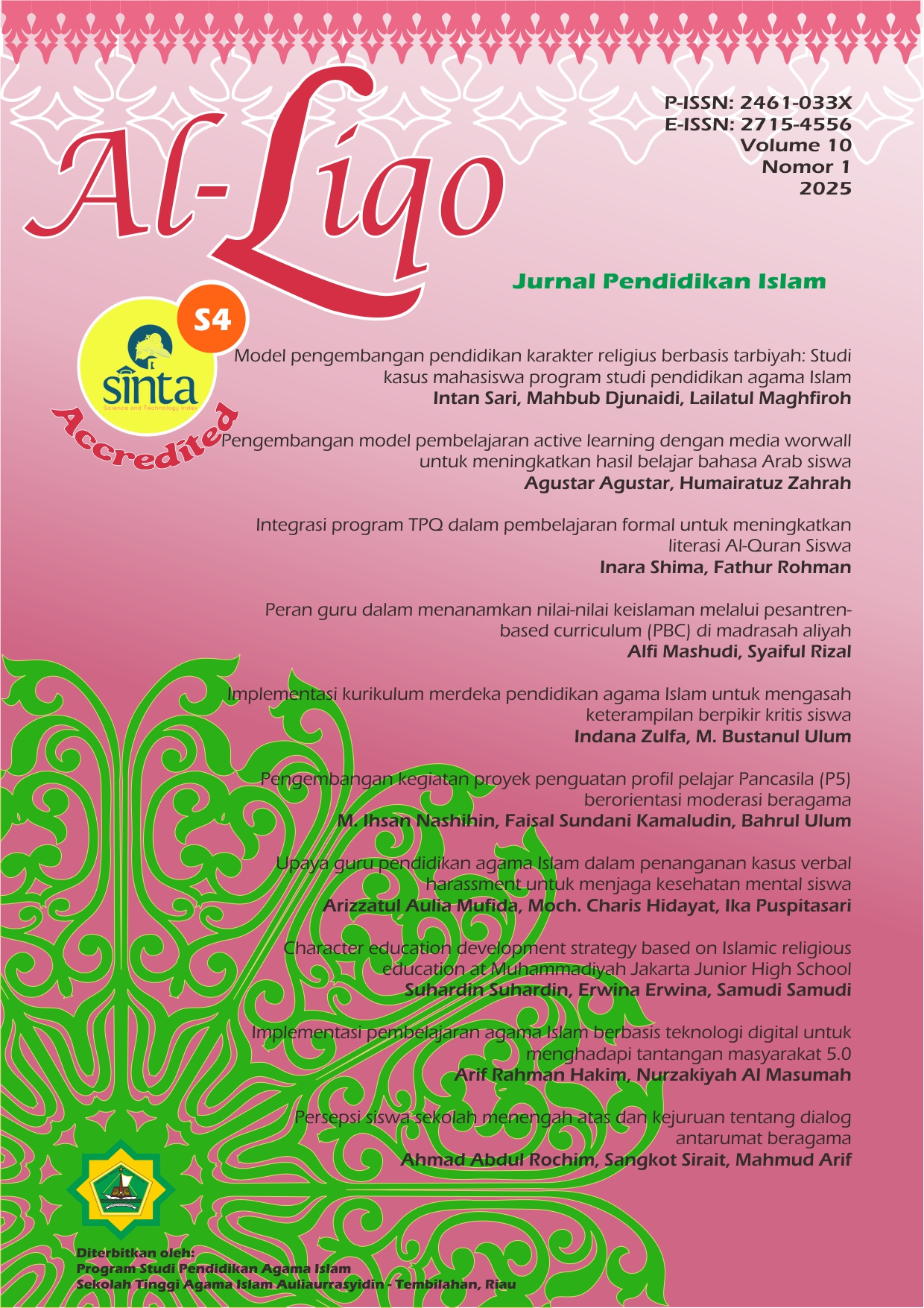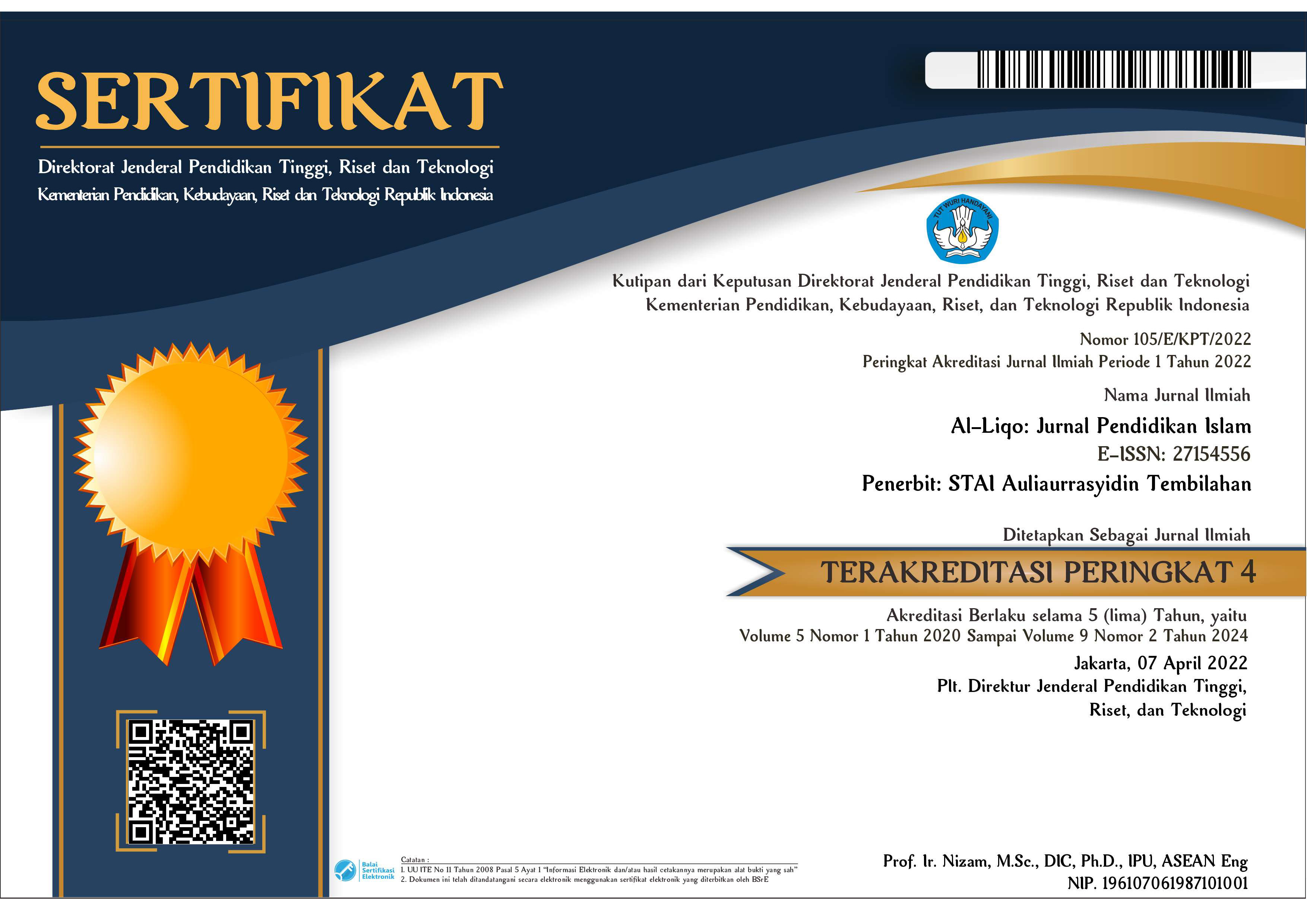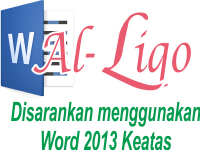Peran guru dalam menanamkan nilai-nilai keislaman melalui pesantren-based curriculum (PBC) di madrasah aliyah
DOI:
https://doi.org/10.46963/alliqo.v10i1.2752Keywords:
Pesantren-Based Curriculum, Teacher's Role, Islamic ValuesAbstract
Islamic education plays a strategic role in shaping the character and morals of students. One relevant approach is the Pesantren-Based Curriculum (PBC), which adopts the pesantren education method in madrasahs. This study examines the role of teachers in instilling Islamic values through PBC at MA Al Huda Kotawaringin Lama, as well as the challenges in its implementation. Using a qualitative case study method, the results of the study show that teachers play a central role as educators, facilitators, and role models through learning yellow books, habituating worship, and instilling morals. The obstacles faced include limited facilities, lack of teacher understanding of PBC, and challenges of integration with the formal curriculum. Globalization and technology demand innovation in learning. The success of PBC is determined by teacher competence, role models, and institutional support. Strengthening teacher capacity and supporting policies are strategic steps to optimize the role of teachers in shaping a generation of Muslims with character.
Downloads
References
Afandi, M. A. (2021). Peranan Guru Sebagai Model Dalam Membentuk Kepribadian Islami. Al Ibtida’: Jurnal PGMI, 9(2).
Afandi, M. A. (2021). Peranan Guru Sebagai Model Dalam Membentuk Kepribadian Islami. Al Ibtida’, 9 (2).
Alwi, M., & Mumtahana, L. (2023). The Principal’s Strategy in Improving the Quality of Teacher Performance in Islamic Elementary Schools. Kharisma: Jurnal Administrasi Dan Manajemen Pendidikan, 2(1).
Amelia, C., Aprilianto, A., Supriatna, D., Rusydi, I., & Zahari, N. E. (2022). The Principal’s Role as Education Supervisor in Improving Teacher Professionalism. Nidhomul Haq: Jurnal Manajemen Pendidikan Islam, 7 (1)
Arista, H., et al. (2023). Gaya Kepemimpinan Kepala Madrasah Dalam Pembentukan Karakter Religius Peserta Didik. Kharisma
Azmi, M., Akmansyah, M., & Amiruddin. (2024). Pendekatan Dalam Integrasi Kurikulum Pondok Pesantren Dan Madrasah: Studi Di Pondok Pesantren Al Hikmah Bandar Lampung. Bustanul Ulum Journal of Islamic Education, 1(2).
Balighoh, Nilna Hikmatun. (2022). Manajemen Kurikulum Pesantren Hidayatus Sholihin Gurah Kediri Dalam Bingkai Integrasi Pendidikan. Jurnal Ma’rifat, 7 (1).
Dar Hammond, L., Hyler, M. E., & Gardner, M. (2020). Effective Teacher Professional Development. Learning Policy Institute.
Eva, E., Yosro, N., Ristianti, D. H., et al. (2020). Eksistensi Guru PAI Dalam Pembentukan Karakter Peduli Lingkungan Peserta Didik. JOEAI, 3(2), Article 2.
Fahra Utami, F., Anggraini, W., Negara, A. I., Abdurrahmansyah, & Salsabila, N. A. (2024). Teacher Strategies in Building Islamic Value-Based Competencies and Optimizing Technology in the Digital Age. EduStream: Jurnal Pendidikan Dasar, 9(1).
Hasan, I., & Hefniy, H. (2023). Transformation Of Traditional Values to the Phenomenon of Santri Courtship in the Digital Era. Jurnal Islam Nusantara, 7(2).
Hasan, M. & Hefniy, H. (2023). Strengthening Brand Identity: Embracing Local Wisdom Through Character Education Management. Indonesian Journal of Education and Social Studies, 2(2).
Hayani, Aida, Nurdiana, Ahmad Zulfikar Habibullah, dan Ahmad Salim. (2022). “The Tracing the Internalization of Adab in Islamic Education Perspective of Syed Muhammad Naquib Al-Attas.” Sunan Kalijaga International Journal on Islamic Educational Research 6 (1)
Huda, N., & Maemonah, M. (2022). Penerapan Modelling Teori Albert Bandura Pada Mata Pelajaran Fikih Di MI Ummul Qura. Al Madrasah, 6(4), 1088–1203.
Hujumy, M. A., Khoiroh, U., & Khaer, A. (2023). The Role of Islamic Religious Education in Implementing Moral Values in the Digital Era in Madrasah Tsanawiyah. Proceedings of International Conference on Education, Society and Humanity.
Ihsan, I., Zuhri, A., Annas, A., Noor, F. M., & Muthmainnah. (2024). Curriculum Management in Pesantren-Based Madrasah for Impforenting Religious Moderation. QUALITY.
Ihsan, S., & Noor, M. (2022). Adaptive Pedagogical Approaches in Islamic Education: Addressing the Needs of Contemporary Learners. Asia Pacific Journal of Education, 42(2).
Karwadi & Indrawan, D. (2023). Islamic Religious Education Teacher Strategies in Internalizing Character Values in Madrasah Ibtidaiyah Students. Jurnal Cakrawala Pendas, 9(2).
Kasman, Adi. Ikhwan M. dan Aziz, Darlis. (2022) “Pendidikan Islam Sebagai Penguat Aqidah Dan Akhlak Di Era Society 5.0,” Cendekia: Jurnal Kependidikan dan Kemasyarakatan, 20(2).
Khotimah, H., Manshur, U., Zaini, A. W., & Suhermanto, S. (2024). Increasing The Competence of Islamic Religious Education Teachers from a Madrasah-Based Management Perspective. Managere: Indonesian Journal of Educational Management, 6 (1).
Maghfirah, Nurul. (2023). Peranan Guru Pendidikan Agama Islam Dalam Menanamkan Nilai-Nilai Agama Islam Bagi Anak-Anak Pemulung Di SD Islam Impian Makassar (Skripsi, UIN Alauddin Makassar).
Muhja, Z. A., Miftahul Arifin, M., Subroto, D. E., Mamonto, M. F., & Julia, P. (2022). Urgensi Memperkokoh Eksistensi Pendidikan Agama Islam Dalam Fenomena Era Inovasi Disruptif. Jurnal Pendidikan Dan Konseling, 4 (5).
Musfah, J., Zakaria, R., Sofyan, A., Sayuti, W., Ridho, K., Fauzan, F., & Muawam, M. (2020). Pesantren-Based School Curriculum Integration Model in Indonesia. MANAGERIA: Jurnal Manajemen Pendidikan Islam, 5(2).
Muthoharoh, (2023) “Internalisasi Nilai Pendidikan Agama Islam di SMP Nurul Jadid Paiton: Studi tentang Posisi al-Sunnah dan al-Hadits,” Prosiding IceSH.
Parnawi, Alfi, & Ar Ridho, Dian Ahmed. (2023). Peran Guru Pendidikan Agama Islam Dalam Menanamkan Nilai-Nilai Moral Dan Etika Siswa Di SMK 4 Batam. Jurnal On Education, 5(3).
Rosita, D., Sutisnawati, A., & Uswatun, D. A. (2022). Pendidikan Karakter Nilai Disiplin Dan Tanggung Jawab Dalam Pembelajaran Tematik di SD. Jurnal Cakrawala Pendas, 8(2).
Sugiyono. (2021). Metode Penelitian Kualitatif. Bandung: Alfabeta.
Sugiyono. (2021). Metode Penelitian Kuantitatif, Kualitatif Dan R&D. Bandung: Alfabeta.
Sukma, A. S. (2020). Pembentukan Karakter Berbasis Keteladanan Guru dan Pembiasaan Murid MI Al Biruni Makassar. Education and Human Development Journal, 5(1).
Sulistyowati, Nova Arum. (2022). Peran Guru Pendidikan Agama Islam Dalam Penanaman Nilai-Nilai Islam Peserta Didik Di Sekolah Dasar Islam Terpadu Shahabat Plupuh Sragen Tahun Pelajaran 2022/2023. MODELING: Jurnal Program Studi PGMI, 9(2), 421–431.
Supriyanto, S. (2022). Curriculum Management and Development of Multicultural Values Based Learning. AL ISHLAH, 14(4).
Surya, P., & Rofiq, M. H. (2021). Internalisasi Nilai Karakter Jujur Dalam Proses Pembelajaran Di Mts Unggulan Hikmatul Amanah Pacet. Munaddhomah, 2(1).
Usman, & Maryam. (2021). Peran Guru Dalam Pembina Pondok Pesantren Nurul Yaqin Dalam Menanamkan Nilai Keislaman Santri di Madrasah Aliyah 1 Atapange Kabupaten Wajo. Jurnal Pilar: Jurnal Kajian Islam Kontemporer, 2(1).
Widodo, Joko. (2021). Metodologi Penelitian Kualitatif: Teori dan Praktik di Lapangan. Yogyakarta: Deepublish.
Yulindaputri, T., & Hamami, T. (2021). Peran Guru Dalam Proses Pengembangan Kurikulum PAI. Jurnal Online UIN Raden Fatah.
Downloads
Published
Issue
Section
License
Copyright (c) 2025 Alfi Mashudi, Syaiful Rizal

This work is licensed under a Creative Commons Attribution-ShareAlike 4.0 International License.
Authors who publish with this journal agree to the following terms:
1. Copyright on any article is retained by the author(s).
2. The author grants the journal, right of first publication with the work simultaneously licensed under a Creative Commons Attribution shareAlike 4.0 International License that allows others to share the work with an acknowledgment of the work’s authorship and initial publication in this journal.
3. Authors are able to enter into separate, additional contractual arrangements for the non-exclusive distribution of the journal’s published version of the work (e.g., post it to an institutional repository or publish it in a book), with an acknowledgment of its initial publication in this journal.
4. Authors are permitted and encouraged to post their work online (e.g., in institutional repositories or on their website) prior to and during the submission process, as it can lead to productive exchanges, as well as earlier and greater citation of published work.
5. The article and any associated published material is distributed under the Creative Commons Attribution-ShareAlike 4.0 International License







2.png)



